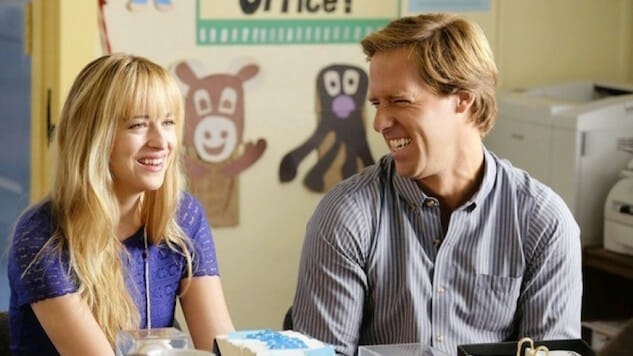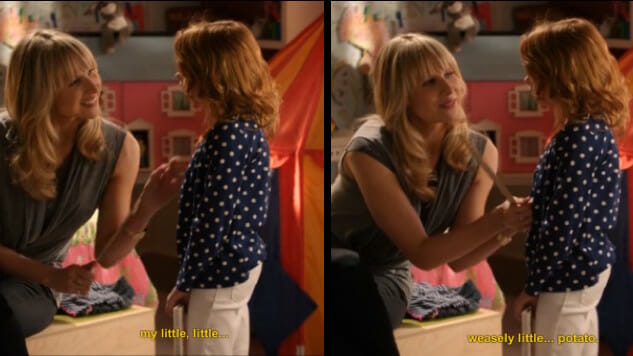ICYMI: How Ben and Kate Easily Provided Four of the Best Comedic TV Performances of the Past Decade
Photos Courtesy of Fox
The 2012-2013 television season saw the debut of a number of memorable—albeit not quite good—one and done television series. It was the season of 666 Park Avenue (a.k.a. You’ll Get ‘Em Next Time, Rachael Taylor) on ABC, Do No Harm (a.k.a. Dr. Face Hands) and Animal Practice (a.k.a. Dr. Monkey) on NBC—even though some quality snuck out in the form of NBC’s one-season Go On (a.k.a. GOON)—and longer-lasting series like ABC’s Nashville and NBC’s Hannibal. This ICYMI column isn’t necessarily about single-season shows, but as it turns out, a lot of single-season shows were, in fact, missed by most people. Go figure. However, there was one truly great series that lasted one season during 2012-2013: FOX’s single-camera sitcom Ben and Kate.
Nat Faxon and Dakota Johnson starred as the titular Ben and Kate Fox, an older brother-younger sister duo that reunited after human circus Ben moved into almost-too-anxious-to-function (but not too anxious) Kate’s garage to help her—a young single mother—raise her six-year-old daughter, Maddie (Maggie Elizabeth Jones). Rounding out the cast of characters were BJ (Lucy Punch), Kate’s “glamorous enigma” party girl best friend and co-worker, and Tommy (Echo Kellum), Ben’s ride or die best friend and a man forever after Kate’s heart. The series was created by Dana Fox, one-forth of “The Fempire” with Diablo Cody, Lorene Scafaria (who served as consulting producer and writer on the show), and New Girl creator Liz Meriwether and who would later go on to co-write the romantic comedy How To Be Single, starring her Ben and Kate lead Dakota Johnson.
Ben and Kate was a series that managed to seamlessly blend the hangout comedy (especially the successful brand of hangout comedy that came from this era) and family comedy genre well, both without being too sanitized (appeasing the latter but hurting the former) and without being too caustic (appeasing the former but hurting the latter). To compare it to another hangout/family comedy from the same era, Cougar Town had it easier by having its “child” character be someone in his late teens; there were moments where characters tried to shield him but never to this extreme. But Ben and Kate actually mined more comedy out of the balancing act of having to do both, with the Maddie character functioning in a way that didn’t hinder the more adult humor. Instead, it made it funnier, whether the show chose to have the jokes go completely over her head (because she was six), or had her question certain comments (because she was six) or made the adult characters struggle to either explain or change the subject, or—in the best version of this—had BJ treat her like any other adult human she disdained (despite the fact that she was six). Maddie was also the rare child character who was funny without being precocious: She was six years old, and she acted six years old, never once understanding or saying anything she shouldn’t say.
In a series full of all-time great comedic performances from its entire cast, Lucy Punch’s BJ was easily one of the best original comedy characters of the 2012-2013 television season—if not THE best, given the competition—with a performance that, to this day, makes anyone who’s aware of it wonder why Lucy Punch isn’t dominating television right now. BJ was a character who could insult a six-year-old—whether it was to the child’s face or to the child’s mother—out of pettiness or give a rambling, but kind of genius impromptu monologue that managed to both insulted and raised up another character at the drop of the hat.

The pilot, it’s worth nothing, has Kate utter the line that best describes the character for the entirety of the series: “I don’t know what to do with my body.” (She then proves that with a great bit of physical comedy, as she would do for the rest of the series.) While it’s, of course, worth noting just how great BJ was because of how good Lucy Punch was and always is—which was also apparent in CBS’s one-season comedy The Class in 2006, also obvious ICYMI fodder—the most frustrating thing about Ben and Kate’s lack of success and seeming disappearance in the pop culture discussion is the fact that people don’t understand just how funny of an actress Dakota Johnson has proven herself to be and is. Johnson’s Kate was a mix of non-stop self-deprecation and realistic (but still hilarious) awkwardness that has yet to be duplicated, especially when you factor in her ability to also pull off how much Kate loved and excelled at being a single mother on top of that. While the Kate character was 26 years old, Johnson was only 23 at the time, a fact that regularly made it even more impressive just how rich and honest she was able to make her performance.
The sixth episode of the series, “Scaredy Kate” (a Halloween episode), was the perfect distillation of Johnson’s performance as this character—as well as the peak of the series, which still remained great after—providing endlessly quotable (“What’s bippin’ ? What does that mean?”) and referenceable (her seemingly scissor-based pantomiming of what sex would be like after a long drought). It was, like the show as a whole, the type of performance that suggested she would be a comedy staple for years to come… which hasn’t been the case (even after a successful Saturday Night Live hosting appearance also backed up that belief), though she has of course managed to have an interesting and successful career outside of the genre. Even in the charming and somewhat underrated romcom How To Be Single—where co-writer by Dana Fox was well aware of Johnson’s strengths as an actress and a comedic one at that—while Johnson was able to play a more subdued version of some of Kate’s qualities, it just wasn’t the same in terms of proving what Johnson could do.
And Ben and Kate worked because it didn’t subdue its characters; it just knew how to make them a lot without making them Too Much. Faxon’s Ben would be the ultimate example of this, as a character who could’ve easily been the anchor that held the show down comedically. The obvious dynamic would have been stick-in-the-mud-Kate versus human-circus-Ben at every turn, with Ben being the “fun” character who the audience would want to see let loose. Instead, the show acknowledged how much of a mess Ben was—as the type of character who didn’t understand a person whose career description didn’t include a multi-hyphenate—without making him a loser or inept. Ben and Kate was an ultimately light-hearted show with a sunny disposition, while still quick-witted in its humor—and it saw both the humor and value in Ben’s spirit as a failed entrepreneur. Unlike Johnson, Faxon was more of a known quality (for comedy nerds, at least) regarding what he would and could bring to the table, and a lot of Ben’s best moments are what amount to (or at least look like) Faxon riffing, either with himself or with Echo Kellum.
As for Kellum, at this point, he is best known for his role on The CW’s Arrow, as everyone on Ben and Kate is essentially best known for something else at this point. But like his fellow Ben and Kate co-stars, that’s not even necessarily a good thing: For someone to only be familiar with Kellum’s work on Arrow and not Ben and Kate, I can only imagine how much they think Kellum’s comedic ability isn’t much more than “nerdy” a pop culture reference here and a cliche “…that just happened” there. After all, outside of Legends of Tomorrow, that’s pretty much the template for the comedic nerd characters in The CW’s Arrowverse. But in Ben and Kate—in a role originally written for a white actor, described in the script as a guy with “long flowy blond hair”—Kellum also provided something hilariously different for a brief moment in time on television. Tommy was the Cool Nerd who was actually cool, as well as a character who could’ve easily been a problematic one on two fronts, both as the black sidekick with little to no agency and as the Nice Guy who pines after a woman who has no interest in him. Instead, Ben and Kate tackled both of those issues head-on—and relatively early on—and subverted them, making Tommy an interesting character in his own right who would drop everything when Ben or Kate called on him, simply because he wanted to be part of the adventure, not because he had nothing else going on. And because there was simply nothing better than a classic Tommy-Ben messaround.
In true hangout sitcom fashion, these characters always managed to find time to engage in shenanigans like the Fox Hunt (a scavenger hunt) or turning the house into a zombie preparedness dril. But the series also made clear that characters like Tommy and Kate actually did have real priorities and professional lives they also had to deal with. Ben, of course, didn’t have a career, and BJ’s whole thing involved her not doing any work (despite ostensibly working with Kate).
For as good as New Girl became and was (it premiered of FOX the previous season and ended up lasting seven seasons), the personality of Kate’s character was less manufactured than that “adorkable” brand of awkwardness, and unlike Zooey Deschanel, Johnson was a natural comedic talent and lead. But funnily enough, just like it’s been easy to forget that, pre-500 Days of Summer (despite it falling somewhat under the same pattern), Deschanel was known as the acerbic indie darling, it’s become easy to forget that, pre-50 Shades of Grey, Johnson had a promising comedic career. (If that female-led 21 Jump Street spin-off does ever get made, it should be a no-brainer that Johnson reprises her small-but-memorable role from the first movie. But it probably won’t be a no-brainer.)
Speaking of New Girl, it’s worth speaking of why Ben and Kate “failed.” Well, it wasn’t a ratings success, simple as that. And despite critical praise, it wasn’t getting any awards recognition. None of this is a question of that—of course it got canceled. But there is something to the fact that Ben and Kate premiered the season after New Girl, Happy Endings, and even past ICYMI feature Don’t Trust the B— in Apartment 23 all premiered. Though all three of those shows premiered right after the hangout sitcom bubble seemed like it had burst, they at least made it past the first season threshold. Had Ben and Kate come in that season along with them, perhaps it would’ve succeeded past the one-season mark, as there would at least be a critical thinkpiece incentive to discuss the rise of these witty, good hangout sitcom in the post-Friends world. Still, it may not have been enough to get Dakota Johnson those much-deserved Emmy and Golden Globe nominations for this show.
One of the most impressive things about Ben and Kate was just how quickly everything clicked and came together comedically. While the pilot is somewhat slower-paced compared to what the rest of the series becomes—with a voiceover that’s not an integral part of the series afterward and a use of flashbacks that the series slowly realizes it doesn’t need—it’s clear who all these characters are immediately and why one would want to watch them every week and for future seasons, should those have existed. Sadly, we didn’t get them.
Despite her mother’s wishes, LaToya Ferguson is a writer living in Los Angeles. If you want to talk The WB’s image campaigns circa 1999-2003, LaToya’s your girl. Her writing has been featured in The A.V. Club, IndieWire, and Entertainment Weekly, among other publications. You can find her tweets about TV shows, movies, and music you completely forgot about @lafergs;.
For all the latest TV news, reviews, lists and features, follow @Paste_TV.







































